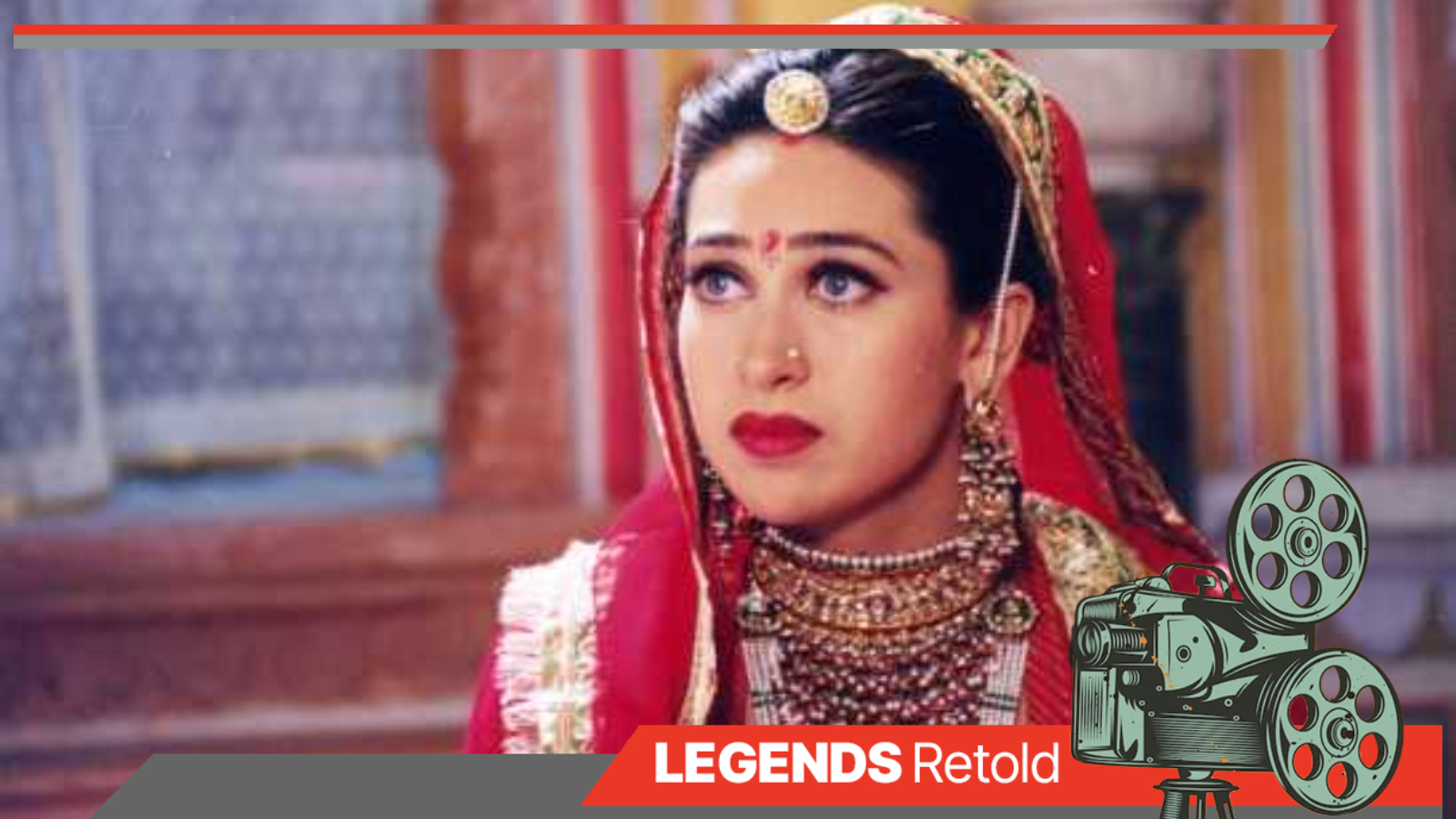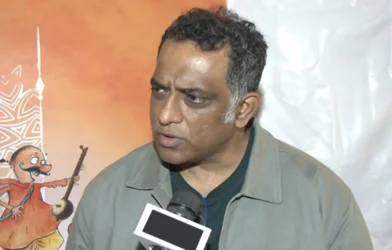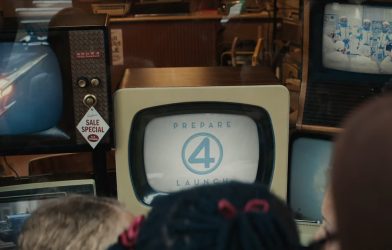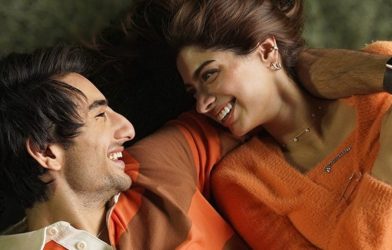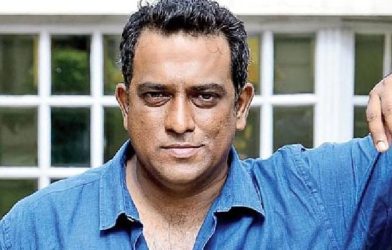As a child she spent her Sundays watching her grandfather and legendary filmmaker Raj Kapoor shooting at the iconic RK Studios. It was perhaps during those days of hanging out on film sets when the acting bug bit her. Karima Kapoor must have been all of seven or eight when, her enormous blue-green eyes awed by what she was witnessing, saw Raj Kapoor explaining a shot to Padmini Kolhapure during the filming of Prem Rog. ‘How cool!’ she must have told herself and started dreaming of facing the camera herself some day.
Years later, when she broke to her grandfather that she wanted to be an actor, he told her, “It is not going to be an easy job. Are you ready? It is not a bed of roses. You have to walk on the thorns to reach the roses.” His words, in a way, foretold Karisma’s future — her journey in movies and path to stardom were filled with thorns, but she trudged on and went on to become the ‘90s darling. But before she became a sensation and came to be known for delivering hits and style goals, Karisma was dismissed by the fraternity.

Unlike the star kids of today like Ananya Panday, Suhana Khan or Janhvi Kapoor, whose every move is chronicled by paparazzi, scrutinised on Instagram and their fame somewhat decided by their social media followers, Bollywood that Karisma had to deal with what was a different beast. In 1991, when 17-year-old Karisma made her debut with Prem Qaidi opposite Harish Kumar, there was no Karan Johar or Zoya Akhtar to craft her launchpad; no team of stylists and PR professionals to groom her image. She faced the camera with raw, unpolished talent and often dealt with criticism.
In her interviews, Karisma’s sister Kareena Kapoor Khan, who credits her smooth entry into Bollywood to the former’s hard work, has often highlighted how there was a lack of support for Lolo, as she is fondly called, when she started her career. But she managed to shine and make her own mark. In fact their father, Randhir Kapoor also admitted to not supporting his daughters, let alone guide their forays into acting. However, Karisma maintained that her father and grandfather backed her when she started out. “I don’t know why everybody is under this illusion. In fact, my father encourages me now. He always tells me, ‘don’t let the Kapoor name down’,” she told Lehren TV in an interview.


Born into the illustrious Kapoor family, with both her parents, Randhir and Babita Kapoor themselves being actors in their prime, Karisma had Bollywood in her blood. Yet, her journey was anything but easy. Her decision to join the film industry, for starters, was a departure from family tradition, often termed as ‘rebellious’ as the Kapoors had largely kept their women away from the silver screen. Her mother Babita and aunt Neetu Kapoor, who was married to Rishi Kapoor, quit films once they set their foot into the Kapoor house. So, for Karisma, to ‘dare’ to aspire to become an actor, was a bold move, one that was met with resistance and scepticism both within and outside her family circle. From being called the ‘ugly duckling’ thanks to her bushy eyebrows and big hairdo to being dismissed for her light eyes, the actor had a tough beginning in the industry.
Today, even though the tag ‘nepo kid’ comes with a heavy price, star kids get easy entry into Bollywood, backed by massive production houses, but back then, Karisma had to pay a price for her famous surname and genetics. “A lot of people initially never really supported her because a lot of people said light-eyed actresses can never become big stars, so ‘don’t’ cast her.’ Also she had the taboo of the Kapoor family,” Kareena said while speaking at Express Adda. Karisma also said in an interview, “With grey, black and brown eyes you can use any colour liner, not with blue eyes. Also, clothes are a problem. I can’t wear greens and reds because they make my eyes look greenish.” It was because of her eyes that directors labelled as too ‘westernised’,” she had to overcome these preconceptions in the coming years.


Her initial roles did not come easy. Karisma mostly found herself in the kind of projects that many of today’s stars would turn down without a second thought. The early 90s were rife with masala films, where the quality of scripts was questionable, and female roles were often ornamental. Karisma had to navigate this landscape, proving her mettle in an industry that was not yet ready to embrace her fully. Even after doing dozen films, which were mostly duds, the industry refused to recognise her or offer her parts that would allow her to experiment.
Prem Qaidi achieved moderate box office success but garnered mixed reviews. Critics found her performance average, with Taran Adarsh calling her acting “mechanical.” The following year proved challenging, with her first five films – Police Officer, Jaagruti, Nishchaiy, Sapne Sajan Ke, and Deedar – all failing to find traction at the box office. However, Jigar opposite Ajay Devgn and the romantic drama Anari, both became box office hits and ranked among the year’s highest grossers.

Karisma’s filmography in 1993 saw four drama releases: Muqabla, Sangraam, Shaktiman, and Dhanwaan. While Muqabla marked her successful pairing with Govinda, the remaining films failed to impress critics or audiences at the box office. The following year was busy for Kapoor with nine film releases. Unfortunately, four of these ventures neither received critical acclaim nor commercial success. In the coming years she acting in several films including Andaz Apna Apna, Khuddar, Dulara, Aatish, Papi Gudia, Megha, Bal Bramhachari, Sapoot, Rakshak, Jawab and Maidan-E-Jung, among a slurry of flop films. Sure, she featured in hits like Raja Babu, Gopi Kishan and Coolie No. 1, but for Karisma, good roles and successful films were far and few. She was stuck in comedy and similar roles.
Karisma battled the industry’s typecasting and was in desperate of a role that would be both clutter-breaking and memorable. “When I first entered the industry, things were tough for me. I am not saying that I was singled out. I think every star kid has to go through this. Everyone was so unfair to me. Other newcomers were praised for every little achievement, but I was not given an iota of acknowledgement. When it came to me, it was always, ‘Okay, she has done well, but what’s the big deal about her?’. Nobody gave a 17-year-old credit for doing my job reasonably well,” she was quoted saying in an archive by Box Office India.

Kareena, during her appearance on Simi Garewal’s show, shared that she would watch her elder sister cry for nights on end to their mother, actor Babita Kapoor. “I have seen my sister sit up for nights together with my mother and cry, saying that people are putting her down and that she would never make it. I would hide behind and watch because they would never want me to see the pain they were going through. I’ve seen too much,” shared the Crew actor. She opened up about being a witness to their “traumas.” “I think I have seen my sister cry for nights together to go to sleep when she was struggling. And that hurts me. Anything that hurts my loved ones hurts me,” she shared.
Her hard work paid off in 1996, when Karisma rocketed to superstardom with her role in Raja Hindustani opposite Aamir Khan. The film shattered box office records, becoming the year’s highest grosser and propelling her to win her first Filmfare Best Actress award. Critics called her a “revelation,” breathing life into what could have been a forgettable movie. Raja Hindustani wasn’t just a megahit; it was a turning point in her career, cementing her place as a top Bollywood actress. What Raja Hindustani also did to Karisma’s career is that it gave her a makeover of sorts. She metamorphosed from being the ‘ugly duckling’ to glamorous diva who was not looked up to as a fashion icon. “My hard work paid off with Raja Hindustani. I wanted to win an award and I got one,” Karisma told Rediff.com in an old interview.

When David Dhawan’s Hero No 1 hit theatres in 1997, it was more than just another comedy in the crowded Bollywood landscape. For Karisma, it marked a significant turning point in her career. Her impeccable comic timing, dancing skills and undeniable chemistry with Govinda endeared her to audiences. The film also cemented her pairing with Govinda as one of the most beloved and successful duos of the 90s. “Hero No 1 was a game-changer. So honestly, when Hero No. 1 happened, I think from that movie in that commercial space, things kind of changed,” she told India Forums.
Karisma’s career reached new heights with the release of Dil To Pagal Hai, a choice she called a ‘risk.’ Starring Shah Rukh Khan and Madhuri Dixit, the film saw her play a supporting role. Playing the character of Nisha, a vivacious dancer hopelessly in love with her best friend Rahul (played by Shah Rukh Khan), Karisma brought depth and vulnerability to her performance that resonated deeply with audiences and critics alike. She proved that could hold her own alongside top-tier actors like Shah Rukh Khan and Madhuri Dixit. She not only floored the audience with her dance moves in “Le Gayi” but also overshadowed Madhuri in their dance battle ‘The Dance of Envy’ choreographed by Shiamak Davar.

“Every actor had refused to do this movie, including me. Because nobody wanted to dance with Madhuri Dixit,” Karisma told The Telegraph, adding, “But the role was so unusual. It was ahead of its time. Normally, in those days you had to be the heroine and win the hero. You had to get the guy. And here there’s an actress who was at the top of her game but not getting the guy.”
Karisma not only won Filmfare Award for Best Supporting Actress, the film’s success opened new doors for her and she began to receive offers for more substantial and varied roles, allowing her to break free from the typecasting that often plagued actresses of her era. Following the success of Dil To Pagal Hai and Biwi No. 1 (1999) — a refreshing change from male-centric titles — Karisma acted in Fiza (2000) and Zubeidaa (2001), which highlighted her ability to tackle diverse and demanding roles. Before Khalid Mohamed’s Fiza, Karisma was often associated with commercial masala films and light-hearted roles; the film showcased her ability to handle weighty, dramatic subjects and multi-dimensional characters. She won a Filmfare Award for Best Actress (Critics).

Shyam Benegal’s Zubeidaa told the tragic story of Zubeidaa Begum, an actress and the second wife of Maharaja Hanwant Singh of Jodhpur. Karisma, in her role, brought to life the complexities of a woman torn between her passion for acting and the constraints of royal life, winning a Filmfare Critics Award. Talking about these female-centric roles, Karisma, told Asian Age, “In that way, I was trying to change things and break the barriers. Even doing films like Fiza and Zubaida were one of them. Today the ‘biopic’ thing is really in and I did that 19 years ago. I never tried to play by the rule book. Even though I was a ‘commercial actress’ and successful, I was trying to break barriers at that time.” When the audiences were expecting Karisma to feature in more meaty roles like those in Fida and Zubeidaa, but she went on to do masala entertainers and rom-coms. While some were hits, there were misses, too!

Karisma’s personal life is marked by high-profile relationships, a publicised engagement, marriage, and eventual divorce. Her journey has been a blend of personal highs and lows, which she navigated with grace and resilience. In 2002, Karisma Kapoor’s engagement to Abhishek Bachchan, son of Bollywood icons Amitabh and Jaya Bachchan, made headlines. However, the engagement was called off in early 2003. The reasons for the breakup were not officially disclosed, leading to widespread speculation and media scrutiny.
Karisma’s decision to step away from the limelight at the height of her career was a bold and personal choice. In the early 2000s, at the peak of her career, she took a step back from acting. Karisma married industrialist Sanjay Kapur in 2003. Like many actresses of her time, she chose to prioritise her family life over her career. Karisma and Sanjay had two children, a daughter named Samaira, born in 2005, and a son named Kiaan, born in 2010. The couple got divorced in 2014.

The actor returned to showbiz with Mentalhood but both the series and her role were soon forgotten. There are no ‘karishma’ in her role. Similarly, Murder Mubarak did no justice to her calibre as an actor. However, her portrayal of Rita Brown, in Brown stood out. Today, the actor may be choosy about her work and occasionally appearing in films, OTT and reality shows, but her fans are still in love with the vivacious Lolo who wooed them with her dance moves and acting.

